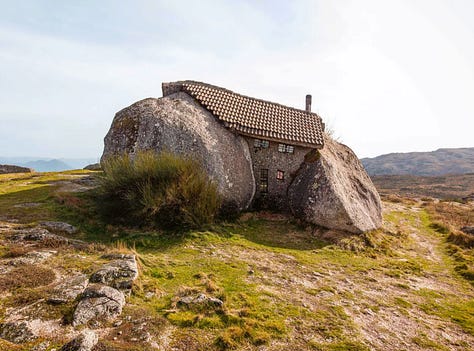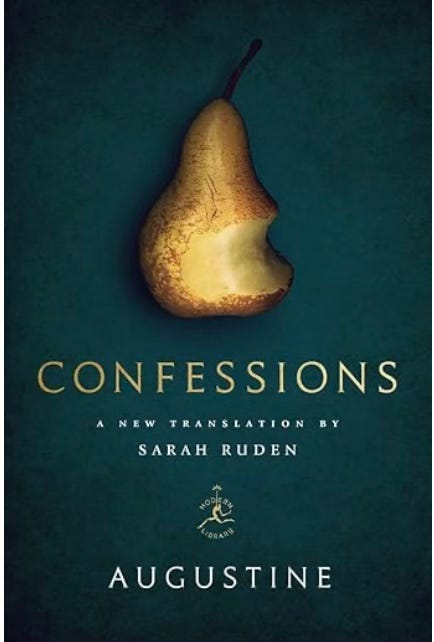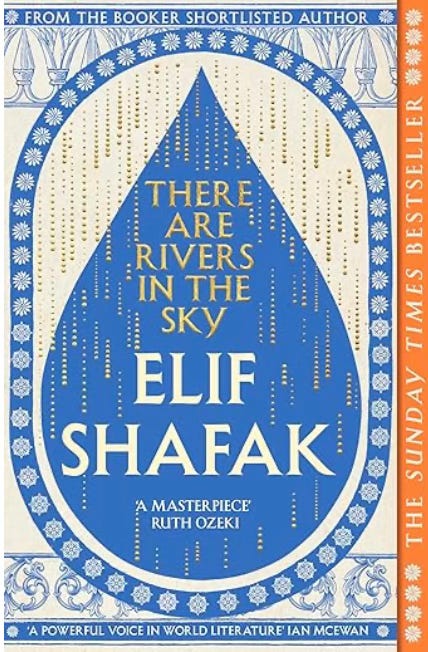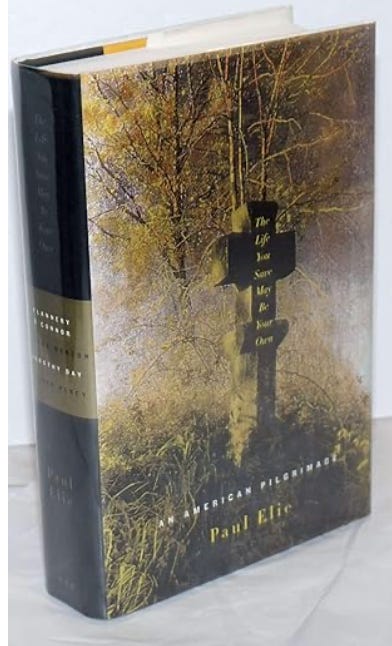The Lectio Letter - Issue #97 - Are you free indeed?
“A Christian is a perfectly free lord of all, subject to none. A Christian is a perfectly dutiful servant of all, subject to all.”
— Martin Luther, The Freedom of a Christian (1520)
“True liberty is not the power to live as we please, but to live as we ought.”
— John Wesley
“Freedom is not something a man has for himself but something he has for others. A free man is a man who lives for others.”
— Dietrich Bonhoeffer, Act and Being

Welcome to Issue #97 of the Lectio Letter. This members-only newsletter is filled with music, film and food suggestions, links, and an article written by yours truly. If you happen to be new here, there’s a whole 96 other issues you can explore here!
I started out writing this post 3 weeks ago, and it began in my mind as an article on keeping the Sabbath. Well, it seems that might have to re-emerge at a different time because as I wrote the introduction on what freedom is for, what you read below emerged. I’ve wrestled with the article below, because the whole time I was writing it I expected to turn towards a conversation about spiritual disciplines like sabbath being acts of self-restraint. A use of freedom for something not just being free from something. It’s far too easy for us, as I discuss below, to fill our sense of what freedom is from sources outside of the christian tradition. As they say, the best lies are the ones with just enough truth mixed in. Our understanding of freedom needs to be enlarged, not only as freedom from but freedom for.
Since I wrote the article a few weeks ago, there has been a significant increase in political temperature in response to the heinous murder of Charlie Kirk. I make some comments related to politics in the article but I want to be explicit that what I’ve written below was written before that occurred and does not have any coded message about my perspective on that.
Anticipating a follow on to this article, I encourage you to hear me behind this article aiming for our relationship with the practises of sabbath, prayer and bible reading.
Do we need to practise sabbath, prayer and bible reading to be loved by God, certainly not! They do not qualify us, but they will deepen our ability to participate more fully in the loving life God has shared with us. As the quotes I’ve chosen at the top of this indicate, our freedom is for something, it’s for following Jesus and loving others.
Whether you become a paid subscriber or not, I’m very grateful to each of you who read and respond to this newsletter.
PSA: This email is LONG and due to some obscure technical reasons on Gmail it gets ‘clipped’, which means you are not seeing the whole thing.
You can see at the bottom of the email if it says “message clipped”, then click “View entire message” to see it all.
You are not getting it all if you don’t see my signature at the bottom.Alternatively, if you don’t want to read this in your email, you can use the Substack app (where you can listen to the article read out) or read it online at LectioLetter.com
Status Board
Reading
I’ve been delighted to join a Catherine Project Reading group on Augustine’s Confessions. I have read far more about Augustine than I have read of him which is always an interesting position to be in. Maybe I’ll share more on this, as I’ll be reading it until December.
“And men go abroad to admire the heights of mountains, the mighty waves of the sea, the broad tides of rivers, the compass of the ocean, and the circuits of the stars, yet pass over the mystery of themselves without a thought.”
― St. Augustine of Hippo, Confessions
I just finished my second novel by Turkish-British author Elif Shafak, There Are Rivers in the Sky. Shafak is an excellent writer, and this novel shifts between three characters in three different time periods whose lives ultimately connect. Two of the characters are in London—one in the Victorian era, the other in 2018—and the third is a Yazidi girl in Turkey who travels to Iraq in 2018.
“Remember, my heart. Story-time is different from clock-time.’ Clock-time, however punctual it may purport to be, is distorted and deceptive. It runs under the illusion that everything is moving steadily forward, and the future, therefore, will always be better than the past. Story-time understands the fragility of peace, the fickleness of circumstances, the dangers lurking in the night but also appreciates small acts of kindness. That is why minorities do not live in clock-time. They live in story-time.”
― Elif Shafak, There Are Rivers in the Sky
This work, along with another novel, The Island of Missing Trees, about the conflict in Cyprus, weaves a fascinating focus on the natural world as a character in the stories.
I finally finished Paul Elie’s biography of the catholic authors, Thomas Merton, Flannery O Connor, Dorothy Day and Walker Percy. It is clearly a masterpiece of literary journalism and is extremely attentive and sympathetic to the complex nature of faith each of them had. While it is ornately written, I couldn’t help by feel by page 480 that it could have achieved its feat with more concision (rich coming from me I know!).
The New Yorker published this short review in 2003;
This long, unusual book consists of interleaved biographies of four mid-century American writers—Dorothy Day, Thomas Merton, Walker Percy, and Flannery O’Connor—who, though they rarely, if ever, met, are connected by the fact that they were all serious Roman Catholics and therefore alone: isolated both from literary circles (anti-religious) and from the Church (anti-literary). Except for O’Connor, they were converts; they “read their way” to religious experience, and then became writers, so that others could pick up the trail. They were very different—Day was devoted to social service, Percy to philosophy, O’Connor to literature, Merton to the inner journey—and Elie doesn’t love them all equally. O’Connor is his favorite. Merton is the one he struggles with, but, by virtue of his warm, clear writing (better than Merton’s), he makes us care about the self-involved friar, too.
The review was interesting to me because, unsurprisingly, I was drawn to the interlaced sections in my own order of interest, awareness and sympathy; Merton, then Day, Then O’Connor and finally Walker Percy who I knew almost nothing of.
Eating

Orange Honey Ginger Glaze Salmon
This has been a firm favourite and I have figured out a few challenges in making it through our numerous attempts.
Ingredients (Serves 2 bowls)
2 × salmon fillets (skin on)
1 cup dry jasmine rice (or substitute basmati or farro)
Butter or oil (for searing)
Sesame seeds (for garnish)
Salt (to taste)
Honey-Orange Glaze
Juice of 1 orange
¼ cup honey
1 tbsp sesame oil
1 tbsp soy sauce
1 tsp freshly grated ginger
1 tsp apple cider vinegar
Cucumber & Avocado Salad (Optional)
1 avocado, chopped
1 medium cucumber, peeled and chopped
½ to ¾ cup cilantro, chopped (optional—can swap parsley or arugula)
1 tbsp sesame oil
Juice of 1 lime
Salt (to taste)
Instructions
If you are making the Cucumber and Avocado salad, you can start with that so it sits in the ingredients in the fridge a little longer. In a bowl, combine chopped avocado, cucumber, cilantro, sesame oil, lime juice, and a pinch of salt. Toss gently (don’t smush the Avo’s) to mix it up and set aside.
In a small bowl, whisk together orange juice, honey, sesame oil, soy sauce, ginger, and apple cider vinegar until fully combined. Set aside.
Cook Jasmine rice anyway you know how!
Use paper towels to pat the salmon fillets as dry as you can and then generously season the skin with salt. Set aside while the pan warms up.
set a small pan on medium-low heat. Pour the honey-orange glaze into the pan and let it gently simmer until it thickens slightly while cooking the salmon fillets in the larger pan.
Heat butter (or high smoke point oil) in a large (ideally carbon steel or cast iron) pan over medium-high heat until hot.
Sear the salmon for 5 minutes on the skin side and 2-3 on the bottom side.
NOTE: Fish in a pan can be a disaster. But think of it like a steak, put the salmon in when the pan reaches a high heat (without burning the oil or butter), skin down. Don’t worry that the skin initially sticks. Leave it alone and it will detach itself. Use tongues to wiggle the fillet until you can tell it’s detached and you’ll have beautifully crispy skin
Place cooked rice in your serving bowls. Top with the glazed salmon. Add a portion of the cucumber–avocado salad on the side, then, and this is optional, drizzle with the sriracha mayo and garnish with toasted sesame seeds.
Listening
Everything Is Recorded is the work of British producer Richard Russell, who runs XL Recordings. The label began in the early ’90s as a dance music imprint, initially hosting groups like The Prodigy, before broadening its roster to include artists such as The White Stripes, Radiohead, and Adele. Notably, Adele’s album 21 boosted the label’s bank balance from £3 million to £32 million in under 12 months. This eclectic track may not be to everyone’s taste, but its production and arrangement have had me so captivated that I’ve been listening to it on repeat for the past few weeks.
September in Cape Town is the prime season for our famously unpredictable weather. One day we’re basking in the breakthrough of summer, with temperatures climbing into the upper twenties Celsius, and the next we’re met with breezy, overcast skies and a chill just above ten degrees. During this time, we (perhaps late arrivals, judging by the play counts) discovered the Australian–Berlin-based band Parcels. Their upbeat, retro-poppy vibes have created an auditory summer of their own. The track below has been our favorite from their recently released album, but the older live recording in the video highlights the depth of musical skill behind that Berlin-flavored retro aesthetic.
Are you free indeed?

“It is for freedom that Christ has set us free” So begins Galatians 5. Jesus Himself says in John 8: “if the Son sets you free, you will be free indeed”. But what did Jesus and Paul have in mind when they spoke about freedom?
Freedom is too easily an accordion word; something that expands and contracts based on how much hot hair is pumped into it. And my friends, the idea of freedom has a lot of hot air pumped into it.
The cry for freedom was the undercurrent that shaped the Western world. It was the cry for freedom from the tyranny of corrupt rulers, the oppression of class-based societies and, more recently, the freedom to choose and define how we use our bodies and even how we define our gender.
In a context of oppression, freedom from can be a very good thing. It may be the only way freedom can be imagined. Yet implicit in the cry for freedom from is the deeper longing to have freedom for, the freedom that allows us to live a free life where we are free to make choices that lead to flourishing. We ultimately desire the freedom to have a good life. But our imagination of what a ‘good life’ is will impact how we understand what ‘freedom’ is.
In History, revolutions, the french and american among others, often secure necessary freedoms, but history shows what happens next. Once freedom from is achieved, factions will ultimately arise. Groups splinter over what that freedom and the ‘good life’ should look like. Once freedom from is achieved, what is this freedom for? It’s a confusion that not only challenges the West, but for the Church.
In the West, an implicit Christian sense of what freedom is for has lingered on, buried in our laws which protect human life, freedoms, rights, and dignities. However, through the movements of the 20th century, especially after World War II, any meaningful society-wide consensus over how to define what freedom is for has dissolved.
For the first time in the past century, vast populations have had freedoms never before seen, yet most political movements of the 20th century remained preoccupied with freedom from. Recognising the power of the cry of “freedom from” to motivate and animate populations, politicians and movements relied on drumming up another enemy or oppressor in order to motivate people with the new rallying cry of freedom from. All this, arguably came from the freest people ever to live.
What does this reflection on Western freedom have to do with spiritual formation? Well first of all, it creates an important backdrop, shaping the cultural "drinking water" of how we perceive freedom. If the Gospel is only freedom from we are left with very little reason to do anything but wait for heaven. But if it’s freedom for, then suddenly we have an opportunity to live a life that flows from what God has done in Christ for us all.
But the attraction to fixate on freedom from remains the ‘drinking water’ in the church, especially those of us protestants, a church born out of the Reformation. Indeed, many still carry the momentum of a desire for freedom from Roman Catholic abuses of the 16th Century. Stanley Hauerwas once observed that Protestants have forgotten what they were protesting. Sadly, we have become people defined by protest itself, splintering into factions over secondary issues. With the assumption that freedom is always freedom from, we may read the gospel merely as an account of Jews seeking freedom from Pharisaical and Roman oversight. While true, this is less than half the story.
Jesus came to announce and inaugurate a Kingdom that was not solely about freedom from. This Kingdom would be the fulfilment of God's intentions for humanity from Eden, to Abraham and through Israel to the world. It offered a vision of human flourishing. It was freedom from and freedom for.
In this vision, freedom from slavery in Egypt, freedom from the crushing weight of Pharisaical Judaism, and ultimately freedom from sin, death, and Satan pointed toward something greater. This something greater was a vision of life as God intended, a life of justice, care, holiness, and flourishing. It was a vision of holiness in which our lives, freed from powers that oppress and kill, are filled with God’s very own life. In this, we are empowered to recover humanity’s original calling to be a people for God’s name, imaging the loving kindness of God to a creation that neither knows or trusts Him.
The Old Testament laws pointed towards what freedom, if it ever arrived might be for. The foundational Abram calling and, in later stages the commandments and laws outlined a vision of a life that faithfully represented God’s loving holiness in detail.
These laws, far from being what we assume are the religious rules for how to approach God in a temple, touched on every area of life: hygiene, sexuality, fairness in law, and care for the foreigner. Jesus fulfilled these laws by living, dying, rising again and ascending, therefore opening the way back for human lives to be embedded in the very life of God. Through Him, relationships would be restored to what they were meant to be, marked by holiness, flourishing, and love.
Too few Christians today have a vision of this good life. Too few wrestle with the call of the Sermon on the Mount or with the insights embedded in Old Testament practices. It seems easier to be against than to be for. It is easier to criticize than to work out in practice what genuine flourishing looks like for a community.
As a result, Christianity is often modified and privatised into another tool within the Western project of individual freedom. The gospel becomes a therapeutic means of gaining inner peace or is weaponised into a political vision that serves the interests of “people like me.” This modified Christian vision may inspire kind words about loving neighbours, but in a culture built on "me first," peace with others only seems to matter if it benefits me and mine.
The biblical witness, however, along with most communitarian cultures outside the West, assumes something very different. In this context, my flourishing is bound up in the flourishing of my neighbor and in the life of the sojourner/foreigner. Life is not lived in a vacuum and there is no good life apart from life with God in community with others.
The good life is not defined by personal prosperity and happiness at the expense of others suffering injustice, which is the situation we largely see in the world today. When we fail to see freedom as freedom for, our Christian gatherings tend towards enthusiastic celebrations of what we are free from. But outside those gatherings, Christian lives are too often marked by the same oppressions, fears and idolatries that weigh down our non-Christian neighbours.
In the early chapters of Exodus, God speaks to Moses and tells him to say to Pharaoh, “Let my people go…so that they may worship me.” Many social justice movements have run with the first half of this statement but have left the second half undefined and unattended. However, here in Exodus we have a vision of God’s heart for a broken humanity; to experience freedom from and to be renewed to have freedom for. Throughout the scriptures, worship is defined many times not only as religious ritual but as the way our whole lives are lived for God’s sake (see 1 Sam15:22, Rom12:1). We are designed to live a fully human life as God always intended it until he returns to make all things new.
The incredibly good news of the Gospel is that we are free from; free from fear, judgement, death, and the powers and principalities. But we are also freed for a life that sings the goodness of God in word and deed. Just as Israel had to spend years in the wilderness undoing the deforming work of slavery in their lives, so too do we need to gain a vision for a pathway that undoes the works of slavery in our own lives. This work is done by the Spirit of God as we offer ourselves through the rhythms and repetitions of Christian practices like scripture reading, prayer, gathering in worship, and sabbath. These practices do not earn us points with God but they open us up, once more, to hear the voice of a loving God call our name, welcoming us into a people and a salvation story that is freedom from and freedom for.
Miscellaneous Links
Cheech and Chong go Birdwatching?
We recently watched Listers, a documentary about two “pot-headed Gen Z filmmakers” who, in a Cheech-and-Chong-like haze, decide to take on a “Big Year”—an attempt to see as many different bird species in the lower 48 states as possible. What begins as a seemingly airheaded adventure takes fascinating twists and turns. The brothers become genuinely likeable, uncover unexpected depths in themselves, and grow increasingly immersed in birdwatching. Thanks to good story telling-oriented editing and spectacular slow-motion footage of the birds, the film strikes a perfect balance: it maintains enough sarcastic distance to acknowledge the “insanity” of extreme birding, while also capturing the genuine draw that makes it so captivating. Pre-warning: Some bad language/taste moments.
Why Le Creuset is so expensive?
LeCreuset are amongst the most storied of brands and this WSJ insight was fascinating to see the production process and history in their ongoing French-based fabrication.
Brad Pitt drives F1 car
As I’ve mentioned in previous Lectio’s, we are amongst the newbie fans of F1 unapologetically drawn through the Netflix series Drive to Survive. Recently I went to see the movie which is equal parts light entertainment and eye rolling story telling. But it was interesting to see Brad Pitt actually drive an F1 car in the video above.
Space Saving in Japan with 59sqm
I’m always interested in architectural decisions, and this postage-stamp plot in Japan was an interesting compact use of space.
Brand New Battery Powered Bakkie (Pick up) for under $20,000 ??
A fascinating attempt to produce an electric pick up truck made in the US for $20,000. The only catch? no paint, no stereo, and no touchscreen. Read the rest.
Some Weird but Weirdly Beautiful Buildings






Wallpaper features new book Weird Buildings… NO AI here. See the rest.






Definitely reminds me of Jared Boyd's excellent book Finding Freedom in Constraint.